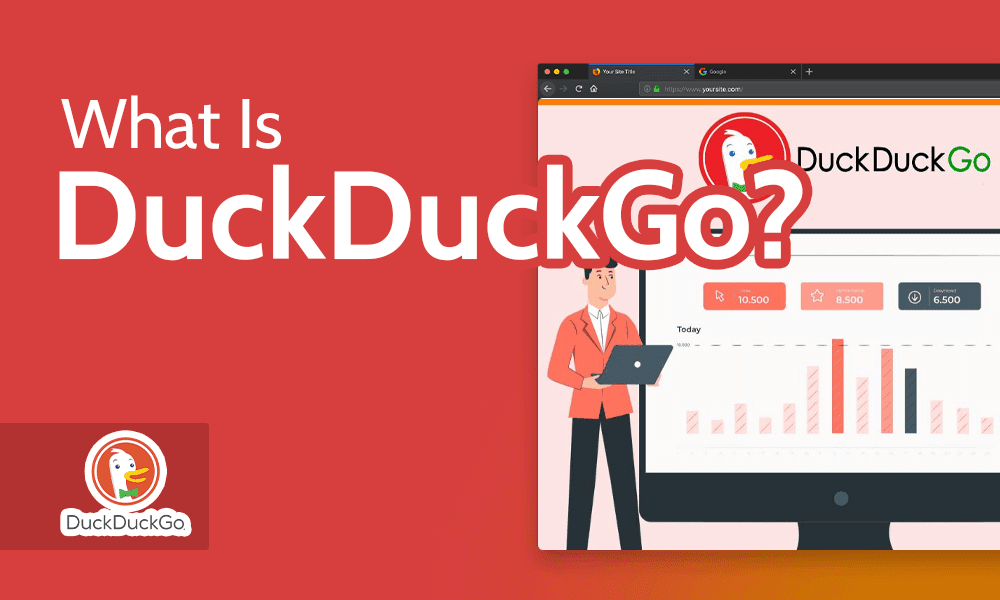
Key Takeaways: DuckDuckGo Explained in 2023
- DuckDuckGo is one of the best private search engines and provides several privacy features for internet users.
- The company offers a search engine and browser, but is known mainly for its search engine.
- Unlike other major search engines, DuckDuckGo doesn’t collect any data that can be used to identify you personally.
- DuckDuckGo has a few privacy limitations. It doesn’t stop ISPs from collecting your data. It also collects approximate location data from your IP, which can be a foundation to track your geographical location.
If you’ve been looking for a more private way to search the web than Google, you may be wondering “What is DuckDuckGo?” DuckDuckGo is a company that provides several privacy-friendly products — most notably its search engine — for people who want to protect their privacy online. DuckDuckGo prioritizes privacy over speed, and is one of the biggest privacy-focused companies in the world.
In this article, we’ll focus on the DuckDuckGo search engine, since it is arguably the best privacy-friendly search engine available. DuckDuckGo can be set as the default search engine on most internet browsers, and it is available as a web page, a browser extension and a mobile application.
We will break down DuckDuckGo’s best features, its search engine, its browser and how well it handles user privacy. Besides DuckDuckGo, there are other search engines that don’t track your search history, such as Brave, Startpage and Ecosia. Read our “best search engines that don’t track” guide to learn about these services.
What Is DuckDuckGo?
DuckDuckGo doesn’t track your online activity and prevents other websites from tracking you too.
With a name inspired by the children’s game Duck Duck Goose, DuckDuckGo was founded by Gabriel Weinberg in 2008. The search engine was created to meet the demand for a privacy-focused search engine. DuckDuckGo maintains a high level of privacy by not collecting any personally identifiable information from its users, and prides itself in not isolating its users in the filter bubble of personalized search results.
Besides the DuckDuckGo search engine, other privacy-oriented products fall under the DuckDuckGo umbrella, including a web browser, browser extension, email protection and app-tracking protection for Android.
Features of the DuckDuckGo Search Engine
Beyond privacy, the DuckDuckGo search engine has some features that make searching the web more efficient.
1. Private Search
DuckDuckGo’s standout feature is private search. Unlike most search engines, DuckDuckGo doesn’t track your searches by monitoring your search queries, IP address, browser and the websites you visit. It only collects aggregate data, which essentially cannot be traced back to you.
DuckDuckGo derives its search results from multiple sources, including Bing, Yahoo!, Wolfram Alpha, Yandex and its own web crawler (DuckDuckBot); it doesn’t derive any from Google.
2. Instant Answers
DuckDuckGo derives instant answers from several specialized sources
across the web so that you get accurate information.
In addition to search results, DuckDuckGo provides instant answers that provide relevant responses from trusted specialized websites. Instant answers minimizes the need for users to open links on the search results page before finding an answer.
DuckDuckGo derives instant answers from multiple sources, including specialized sources such as SportRadar and crowd-sourced sites like Wikipedia.
3. Bangs
Entering “!w ducks” into the search tab will take you to the Wikipedia page on ducks.
“Bangs” are short commands you can type into DuckDuckGo to go straight to your search results on other websites. There are two ways to use a bang: You can type an exclamation mark followed by the short form of the name of the website you want to visit. This will automatically transport you to the homepage of the website.
You can also type an exclamation mark followed by the shortcut and the page you’d like to visit on that website (check out DuckDuckGo’s page on bangs to see the list of all the bangs it has). For example, you can type “!espn” to visit espn.com. However, if you want to visit a page about Ronaldo, you would type “!espn ronaldo.” Bangs are particularly helpful for research.
What is the DuckDuckGo Browser?
Like the search engine, the DuckDuckGo browser was launched as a privacy-focused alternative to all the other browsers that are known for collecting browsing data, such as Google Chrome and Microsoft Edge. Unlike most modern browsers, it isn’t built on Google’s chromium software, which is the source code that powers Chrome, Edge and some other popular browsers.
Like the DuckDuckGo search engine, the browser has several unique features for protecting user privacy, including a YouTube player, tracker blocking and smarter encryption.
Features of the DuckDuckGo Browser
The DuckDuckGo browser comes with several features that help keep your searches private.
1. Duck Player
Any user that prioritizes privacy enough to install a private browser would most likely benefit from a privacy-friendly YouTube player. Duck Player is a YouTube Player that prevents YouTube from tracking the videos you watch and providing personalized search results based on the data collected. In addition to not collecting your personal data, Duck Player keeps you anonymous while you watch videos.
A great bonus of using Duck Player to watch YouTube videos is that your watch time is not interrupted by ads, since YouTube needs access to your data to show you such ads.
2. Tracker Blocking
Most browsers protect your online privacy by stopping trackers on other websites from monitoring your web activity. However, they only do this after the trackers have loaded, giving them time to collect some of your data.
DuckDuckGo prevents third-party trackers from collecting any data by stopping them before they load. DuckDuckGo’s tracker loading protection tool doesn’t block all third-party requests from loading. It only blocks those that are used for tracking.
3. Smarter Encryption
Web addresses that start with “http://” are unencrypted, which means that user activity on these websites is visible to anyone monitoring the connection, including cybercriminals. On the other hand, web addresses that start with ‘‘https://” are encrypted, preventing network onlookers from viewing your web activity.
Smarter encryption is a DuckDuckGo browser functionality that upgrades the high-risk HTTP network connection to the much more secure HTTPS connection. DuckDuckGo scours the web for websites that fully support HTTPS and keeps a record of these websites within its apps and extensions. When internet users visit these websites over an unencrypted (HTTP) network, DuckDuckGo immediately upgrades the network to the more secure HTTPS connection.
Most other browsers do this upgrade only when you’re visiting a website though the address bar, and require you to use private browsing mode or opt-in through advanced settings if you want to visit a website over an unencrypted connection.
Is DuckDuckGo Private?
DuckDuckGo’s privacy policy is easy to read.
Living up to its name as an anonymous search engine and browser, DuckDuckGo has a strict privacy policy. It temporarily uses information sent by your device like your IP address, browser type, operating system and preferences for service delivery. However, it doesn’t log any of this data, including your browsing history, so it has no way of identifying you.
DuckDuckGo prevents its hosting and content providers from saving your browsing history. It achieves this by ensuring that they deliver content through an end-to-end encrypted connection. To enable these content providers to deliver DuckDuckGo products effectively, DuckDuckGo shares anonymous browser and device information with them, but doesn’t share any information that could be used to identify you.
How Does DuckDuckGo Make Money?
Google and other search engines that prioritize user experience over privacy make money through targeted advertising. To create targeted ads, Google tracks users’ search and browsing history and uses the personally identifiable data derived from this data to create ads that are relevant to them. Google makes money whenever users click on these ads.
According to DuckDuckGo, search engines don’t need to track users to make money. While DuckDuckGo makes money from ads, the ads it displays are the result of keywords users enter into the search engine, and not based on personal identifiers like your search terms and browsing history.
Downsides of DuckDuckGo
Privacy protection may be DuckDuckGo’s forte, but it’s not perfect. DuckDuckGo stops third-party websites from tracking you and doesn’t collect your sensitive data, but it has no control over the data internet service providers (ISPs) collect. If you’re concerned about the data exposed to your ISP, you can use a VPN. A VPN will encrypt your data and hide your real IP address and internet activity (read our guide on the best VPNs to use).
Another service that can help protect you from ISPs that collect and sell your data is Surfshark Incogni. Surfshark Incogni automatically sends data removal requests to data brokers on your behalf (read our review of Surfshark Incogni).
DuckDuckGo doesn’t store your IP address, but it collects approximate location data from your IP and deletes it immediately. While this data is not enough to find your exact location, it can be combined with other pieces of information about you on the internet (like your name or username on social networks) to locate you. Again, a VPN will help mask your approximate location data.
DuckDuckGo has a history of working with entities like Yandex for searches in countries like Russia. These companies can only access non-personally identifiable information such as the approximate location of the users. If this is a concern to you, a VPN will be right up your alley.
Another issue with DuckDuckGo is that it derives its search results from Bing, which is known for tracking your searches. For some great alternatives to DuckDuckGo, read our guide on the best alternatives to DuckDuckGo.
Final Thoughts
For over a decade, DuckDuckGo has maintained the top spot as a privacy-focused search engine and browser. It doesn’t track your search and browsing history, and it has several features that prevent third-party services from tracking you. However, it’s not perfect. While DuckDuckGo doesn’t store your IP address itself, it does collect your approximate location to serve you relevant results.
It’s difficult to pinpoint your exact location just with this information, but it can still provide some clues to cybercriminals about your location. To prevent this from happening, use a VPN. Another privacy flaw DuckDuckGo has is that it doesn’t hide your IP address from your ISP. Thankfully, a VPN can help with that too.
In a nutshell, DuckDuckGo is a great search engine for your internet privacy, but it’s not a substitute for a VPN, which helps you achieve a higher level of anonymity when you browse the internet.





